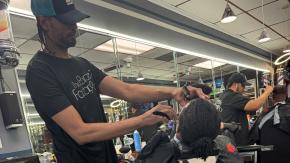
Barbershop talks hosted by our RISE team give men a chance to work through their feelings about relationships, self-love, and masculinity in a space they feel comfortable.
“Love is powerful, caring for people is powerful.”
Those were one man’s words during a candid conversation on relationships, masculinity, and self-love at the Barbershop Factory in the Bronx hosted by our RISE team.
The RISE Project takes a community-led approach to responding to the intersecting crises of relationship violence and gun violence. Driven by the understanding that rates of intimate partner violence are highest in communities most impacted by structural racism and intergenerational trauma, the team promotes healthier, safer relationships by facilitating healing and addressing the root causes of harmful behavior.
One way they do that is by working with men to challenge typical ideas about masculinity and explore what it means to care for themselves and others. Barbershop talks like RISE’s recent event in the Bronx supported by Council Member Kevin Riley give men and boys a chance to open up about questions around gender, fatherhood, and relationships in a space they feel comfortable.
Barbershops are just that kind of space, especially in Black and Brown communities. They serve as important “third places,” places other than home or work where people can socialize and unwind—in many ways crucial to what makes us feel a sense of community. And, as the barbershop talk made clear, they can also be therapeutic.
As they sat down for free haircuts, participants shared their thoughts about trust, making time for self-care, and what men can do to hold other men accountable for doing harm in their relationships. They also touched on the need for mental health support—not just in a professional setting, but also in community spaces among peers, friends, and neighbors.
For our RISE team, meeting people where they’re at—physically and emotionally—is key. By turning familiar spaces into sites of healing and personal change, they work to transform local culture from within and nurture healthier relationship norms.
“It’s not just me,” one man said to sum up the conversation, relieved that he wasn’t the only one struggling with complicated feelings and experiences. He touched on a message our RISE team takes with them everywhere they go as they work with survivors, people who have done harm, and communities impacted by violence: You’re not alone—and all of us are stronger together.

